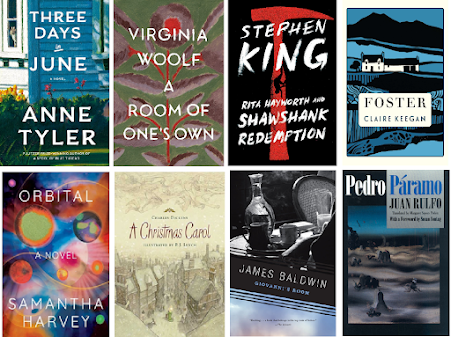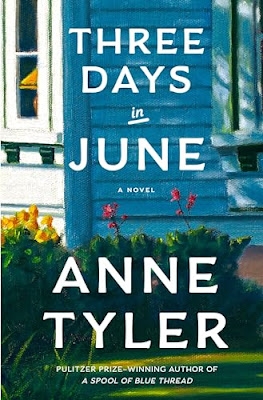Several months ago I ran into the
TIME Magazine list of the 100 best books since the beginning of TIME. (Get it? Since TIME Magazine began as a publication in 1923.) Then I ran into a video made by
Benjamin McEvoy reacting to the top 50 books from the list of 100. "Hmm," I thought, "I didn't know the list was ranked." The titles weren't ranked until Goodreads decided to do so. So the top 50 are the most read and highest regarded books according to Goodreads's algorithm. Among the books on the list, in the 17th spot, is WATCHMEN by Alan Moore.
When I expressed interest in this book several years ago a high school teacher friend warned me Watchmen was full of violence and death. That was enough to squash my interest at the time but when I saw it again on this list -- the best 100 books of the past 100 years! -- I knew time was up, I had to read it.
I've read a ton of graphic novels during my years as a high school librarian and find I quite like the form, so I thought reading Watchmen, the physical reading of the book, would be no problem. I was wrong. Reading comic books and reading graphic novels are different experiences. I figured this out right away. But what is the difference?
Graphic novels usually consist of one or two volumes and are really just books with lots of illustrations. Comics, on the other hand, tend to be shorter and serialized, published over a period of time. For example,
Watchmen was initially published as twelve separate comics by DC comics between Sept. 1986 and Oct. 1987. Information from one comic is worked into the plot of subsequent volumes assuming the reader has read the past material so he/she doesn't need to be brought up to speed. Graphic novels are books and are bound that way. Comics are periodicals and are usually constructed on large pages, folded in half and held together by staples. In the case of
Watchmen, most pages were filled with nine frames and each frame often had lots of people, buildings, furniture, etc. to fill the tiny space in addition to the character or characters who were speaking. My brain went into overload quickly. There was so much to take in and just as much to screen out. Yikes.
Watchmen, which is considered a ground-breaking work of genius, examines a group of American Superheroes and their role in altering the history of the country and the world -- for example, America won the Vietnam war, Nixon is still the President, and the Cold War rages on. But this group of superheroes all are plagued by their all-too-human frailties and failings. The book opens with the murder of one superhero which brings on the sinking knowledge that the others in the group may not be safe either.

That sounds pretty straightforward but I was soon lost in the various backstories of each of the heroes, often leaving me to wonder what was happening and who were all these new "people" I hadn't met yet. Then to make matters even more confusing, there's a comic within the comic. I never did figure out how this story within the story factored into the plot. Oh, one more thing: between each of the 12 comics or chapters, several pages of letters or text (not in comic form) break into the narrative. Single spaced, usually, so one more toughie on the old eyes. I'd like to say these "intermissions" helped elucidate things for me, but most of the time I got no more clarity from them than I did from the illustrations. Sigh.
Before I abandoned the book due to frustration I did a little research first and found a few gems which helped me appreciate Watchmen as an art form and as the genre-bender it was (is?). These commentaries made me more determined than ever to finish it. Let me share a few tidbits with you:
David Boyd, writing a review of the book on his blog said,
For me, that is the genius of this book; just how relevant it is to the real world, both at the time it was written and today. The idea of the elite doing what they have to for what they believe is best for humanity, but having no one to question or monitor them. The famous quote, ‘Who watches the Watchmen?’ could be applied to multiple leaders on either side of the political debate. (Boyd)
Egads! Watchmen, created in the mid 1980s could be talking about today in 2025, who is watching the richest of the rich taking away services from the poorest of the poor. That is a very timely theme.
Boyd also said Watchmen is not a good entry comic. No, duh. Wish I'd read this comment before I started the book but I'm not sure it would have deterred me since I don't read comic books in my daily life and yet I wanted to read Watchmen.
On a
Reddit post about the greatness of
Watchmen, fans had this to say:
Not only did it deal with the concept of superheroes in a refreshingly realistic/subversive way, it's also a savage satire of American 20thC politics and culture. It's also highly scientifically literate, and dense with allusions not only to comic books, but the literary canon in general. (Jeremy-O)
I missed the literary allusions, but I'll take his word for it.
I think it holds this sort of place in the history of comics in the same way that Citizen Kane holds its place in the history of movies. It was one of the first to intentionally use the medium itself as part of the story. Honestly, this is even reflected in the plot. It's a comic book about comic books, featuring a comic book in the story. (wfaulk)
The reference to "Citizen Kane" helps me understand the place
Watchmen holds in the comic world. I didn't particularly like that movie either, but that is beside the point. And clearly I hadn't thought of the use of a comic book inside a comic book as groundbreaking, but there you are.
The next commenter says Watchmen isn't just the greatest comic book of all times, it is the greatest piece of literature. And then goes on to say:
The thing about making superheroes realistic, anti-heroes, and gritty is so surface level. What it really does is use this genre as a lens to inspect political discourse that has become timeless, philosophical ideas are tackled from nihilism, to determinism, to humanism, to the degradation and bastardization of Nietzsche's philosophy as well as the American dream, all the way to how quantum physics alters our perception of reality and miracles. (Adayum)
Clearly this book has a great deal of merit both in and out of its orbit. I don't agree it is the greatest piece of literature, but fans are fans. Besides what do I know, a newbie to the whole comic book world?
And then there is
Shmoop, my go-to for literary analysis. (I love all the snarky asides.) Let's see what they have to say. First to their version of humor:
Holy guacamole, Watchmen! Without you, superheroes would still talk like that, and even worse, they’d have nothing important to say.
Hey, I loved Batman when I was a kid but I see their point. They go on:
Watchmen is more than guys and gals somersaulting around in costume for good and evil. It’s also about psychology—both individual and collective—and in it Moore plumbs the depths of human relationships. When your main character goes by Rorschach, and has inkblot tests for a face, you know the writer is more interested in brains than brawn.
Good point. All the heroes in Watchmen are smart and worried about the state of the whole world. They take their super-hero-ing very seriously. But who watches the Watchmen?
Who watches the watchmen? That question is both Alan Moore’s epigraph for Watchmen and the very last line of the book, so it must be majorly important.
I'm feeling a creepy sense of foreboding these days. Who is watching our politicians and their minions doing all their dirty work? Here we are again thinking of today when this book was written in the 1980s. What's that old definition of a classic? A book that never finishes saying what it has to say. Hmm. Watchmen is here, speaking to new generations of readers (or older generations, in my case.)
We know at some level no superheroes are coming to bail us out of all our messes. But what if? That is a fun idea to think about. Moore takes it to the next level:
And if superheroes were real, wouldn't they have flaws just like us? Wouldn't they live in a world full of greed, fear, homophobia, and more? Yes, yes, they would. If superheroes were real, some of them would grow up in broken homes, and others would be bullied by their peers. Some would be orphans, others children of immigrants. Sure, they might end up wearing masks and tights to cover up their pain.
The folks at Shmoop give one last piece of advice: "If you are going to read one graphic novel that isn't
Maus, read this one."
And I've done it. I've read them both. And thanks to all the snooping around on the Internet, I actually appreciate Watchmen more than when I first closed the back cover. Thanks everyone for the assist!
Watchmen is a tome, weighing in at over 400 pages, so that qualifies as my first Big Book of Summer 2025. It's almost as long as this review. Ha!
Shmoop Editorial Team. "Watchmen Introduction | Shmoop." Shmoop. Shmoop University, Inc., 11 Nov. 2008. Web. 7 Jun. 2025.
-Anne




































